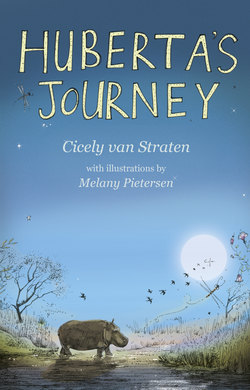Читать книгу Huberta's Journey - Cicely van Straten - Страница 5
На сайте Литреса книга снята с продажи.
ОглавлениеOne
22 November 1928. A soft drizzle veiled an endless sea of sugar cane near New Guelderland in Natal.
“I’m bored!” Ron Smith stomped up and down the stoep and kicked at a chair. “What’s the use of holidays when you can’t do anything!”
He glared at his sister Valerie who had made herself comfortable on the stoep sofa with cushions, a supply of biscuits and a book. Christmas holidays had begun early because of measles at school. It would be weeks before they could leave for Port St Johns, where they spent every Christmas.
“Why not go for a ride on Ginger?” Valerie did not look up from her book.
“You must be crazy. The horse will slip and break a leg in all this mud!” Ron padded up and down the stoep again, kicking at anything in his way. “Nothing ever happens here when it’s raining!”
Just then they heard shouts. Two labourers were running up the drive. “Mr Smith! Where’s Mr Smith?”
Ron wrenched open the front door and yelled into the house, “Dad – you’re wanted!”
Their father hurried out of his office. “What is it? What’s happened?”
“They are finding a hippo on Mr Clarke’s farm! Come quickly, sir!”
“A hippopotamus? Here? There must be some mistake …”
“No mistake, sir. It is in the bushes. Everyone is there, even the people from the newspaper!”
“Well, I’ll be jiggered! We’ll go there in the lorry.”
“Wait, let me get my camera!” Ron shot inside to his bedroom for his precious black box. Then he climbed into the back of the lorry with Gulam and Rajid.
As the lorry churned along the muddy track onto the Clarkes’ land, they saw that the bush thickets near the vlei were swarming with running figures.
Rajid pointed. “Look down there! It is hiding in the bush.”
The lorry slithered downhill and stopped. Several cars were parked nearby and a crowd had gathered around Mr Clarke. He was standing next to a man with a wide hat, glasses and a notebook.
A photographer had set up a camera and tripod near a patch of bush. He called a young man – was it John Dickson, the farm manager? – and gestured with his arms.
Dickson hitched up his belt and began trotting towards a dark thicket while shouting loudly.
Suddenly leaves and branches quivered and a dark, heavy body on short legs charged out at him. Dickson ran for his life towards the cars while the crowd scattered.
When it had chased him some twenty yards, the hippo stopped and trotted back to its refuge in the thicket. Slowly the crowd reassembled.
The photographer beckoned to Dickson, wanting him to lure the hippo out again. Dickson shook his head and argued but finally gave in. He approached the thicket, stopped a few yards short and then stamped and shouted.
Again the hippo charged out at him.
This time Dickson slipped and skidded. With panic on his face, he ran to the Smiths’ lorry and flung himself onto the bonnet.
The hippo trotted after him, uttering a warning “hom-hom-hom!” About ten yards away it stopped, lowered its head and swung it gently from side to side. Its nostrils dilated and it gave a deep, gruff snort, staring curiously at the crowd slowly approaching over the field.
“Dad,” Valerie whispered, “Look! It’s smiling.”
Her father grinned. “Old Mvulankulu used to say that when you meet an imvubu1 in the path face to face, he frowns at you. If you see him from the side, he’s laughing at you, but it is better to meet him from behind, running away, then you can laugh.
“But never get between an imvubu and his home, the water, for then he will chop you in two.”
For one unforgettable minute the hippo stood staring at the people. Then the photographer yelled impatiently. Dickson sprang to life and hammered on the bonnet of the lorry. The startled hippo ran back to its refuge.
Several times the crowd tried to lure the animal out again, but it had retreated deep into the thickets.
“Good. I hope they’ll leave it alone now. Taunting a hippo like that is asking for trouble.” Mr Smith turned the ignition key and circled the lorry through the wet grass towards the home track.
“Where’s it from?” Val wondered. “There haven’t been hippos here for ages.”
“Right,” replied her father. “The last one was shot in Durban in 1898.”
“Do you think anyone will try and shoot it?”
“I hope not. Hippos are protected now. No one may shoot them without a very good reason and a special licence.”
“I wonder why it’s all alone,” Val muttered. “And what will happen to it?”
As he drove home through the deep mud, Mr Smith was frowning. “If this is how people treat that hippo, it won’t be long before someone gets hurt. Then the poor animal will be hounded down and shot as a threat to human life. Let’s hope today’s incident sends it back where it came from.”
